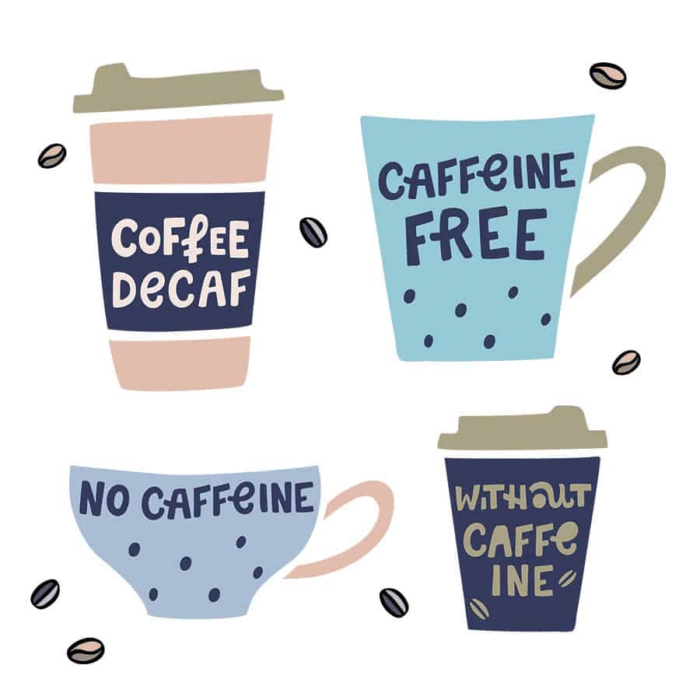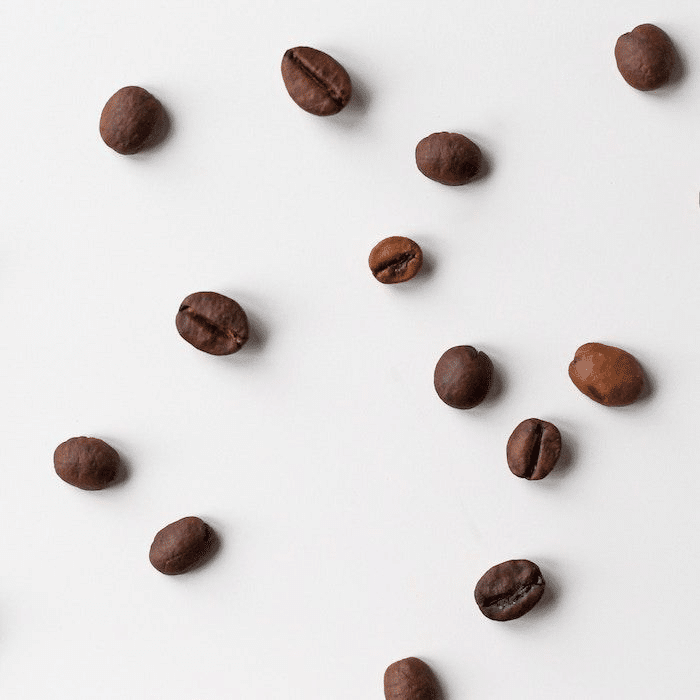If you are reading this, you are perhaps one of the decaf coffee drinkers and want to know more about your drink. If you are not a coffee drinker; this article can somehow guide you with some information on coffee before you decide on whether to drink decaf or normal coffee.
For some time, you have probably heard of decaf coffee as well if you are a coffee drinker. Decaf coffee is another variety of coffee that has been around for a long time, but it is not consumed as much as normal coffee.
Despite controversy; coffee is one of the consumed beverages in the world. It offers a lot of health benefits.
Less than 10% of coffee drinkers drink decaf coffee, meaning more than 90% drink caffeinated coffee. At the moment, we are going to look at the amount of caffeine which is an essential coffee substance in decaf coffee in order to get to know this variety better.

Contents
Decaf Coffee Origin
First of all, let’s get to know what decaf coffee is and where it comes from. Decaf coffee is a shortened name to call decaffeinated coffee. From its name, we can catch a glimpse of what decaf coffee is for and why it has been consumed.
Historically, decaf coffee has been around since the early 20th century and the primary purpose of this coffee is to reduce the amount of caffeine which is the main stimulant in coffee.
The first successful decaffeination process was called “The Roselius Process” by the German coffee merchant Ludwig Roselius.
The process was successfully invented in 1906 due to the merchant’s belief that excessive drinking of coffee poisoned his father. Therefore, he began the decaffeinating process by taking coffee beans to steam with a brine solution.
The solution included water and salt used to saturate the beans. Then he used the organic compound such as benzene as a caffeine solvent chemical. This process was used only during that period of time; benzene was later banned from use because it is known to be a human carcinogen, which is an agent with the capacity to cause cancer in humans.
Today, decaffeinated coffee has been decaffeinated in a newly developed process practiced by many roasting companies.

Recent Developed Decaffeination Process
After the Roselius process had stopped, coffee beans have been decaffeinated in the newly developed process which is safer for your health.
Decaf coffee nowadays is made through 4 decaffeinating processes to remove the caffeine substance from the beans. These processes include using organic solvent chemicals or water to extract caffeine from the coffee beans. The four methods fall into 2 categorical classifications:
- Solvent-based processes: include the indirect solvent process and direct solvent process
- Non-solvent-based processes: include the Swiss water process and carbon dioxide process.
From here you might as well wonder what the differences are among the 4 types of decaffeinating processes. The truth is their differences rest in the solvent agent.
The Solvent-Based Processes
The solvent-based involves adding indirectly or directly the agent to remove the caffeine.
We have mentioned earlier that the previous chemicals used such as benzene, trichloroethylene (TCE), dichloromethane, and even chloroform were harmful to health.
Later on, the agents used turned to methylene chloride and ethyl acetate, which are safer for health. There are multiple solvent agents used in the recently developed process which is considered a health risk (determined by the Food and Drug Administration of the US as a very low-risk to be essentially non-existent) including methylene chloride (CH2Cl2), aka dichloromethane (in Europe) or MC, and Ethyl acetate (CH3CO2C2H5).
These substances have been used as decaffeination agents because they are very volatile and would not survive the roasting process. Therefore, they will be vaporized (vaporize at 104 degrees F) since the roasting temperature is over 400 degrees F.
One of the solvent-based processes is the indirect solvent-based process. The indirect-solvent-based process includes soaking beans in near-boiling water for a few hours.
This process extracts the caffeine and other flavor elements and oil from coffee beans. The water from soaking the bean is transferred to another tank where beans are washed for approximately 10 hours with methylene chloride which is one of the solvent agents. Then heat it to evaporate the solvent and caffeine.
Another method is the direct-solvent-based process involves steaming beans for about 30 minutes to open their pores. Then repeatedly rinse them with one of the solvent agents for about 10 hours to remove the caffeine. After that drain the caffeine-laden solvent away, and steam the beans again to remove the residual solvent in them.
The Non-Solvent-Based Process
The non-solvent-based process contains a bit different method from the first category. The Swiss Water process resembles its name, has its origin pioneered in Switzerland in 1933 whose name was shortened to SWP.
It became the essential decaffeinating process for the industry which, then, was introduced to the market and had its operation in Canada. The SWP includes soaking coffee beans in very hot water to dissolve the caffeine.
After that, the beans are put in the charcoal filter to extract the stimulant from the beans. Eventually, we get coffee beans with no caffeine. Also, the process is essentially known as the organic decaffeinating method because of its non-chemical material use.
It is also known as the most ecological way to separate the compounds and extract caffeine. On top of that, it is one of the expensive processes to produce decaf coffee.
The next non-solvent-based process besides the SWP is known as the CO2 process or carbon dioxide process. This process is found in the Max Plank Institute by scientist Kurt Zosel.
It includes soaking coffee beans in the stainless steel called the extraction vessel then sealing it with CO2 and forcing it under pressure (1000 pounds per square inch) to extract caffeine.
This method is mainly used to decaffeinate a large amount of coffee for commercial-grade commodities and the market. Additionally, different separating processes also influence certain flavors in coffee as well. They have different impacts on chemical compounds that generate the unique flavor of coffee and the sensory character of the coffee.

The Difficulty in Maintaining The Quality of Decaf Coffee
Moreover, decaf coffee beans are really difficult to roast, unlike normal beans, they are less likely to respond consistently in the roasting machine meaning that it is hard to control their roasting process.
The normal coffee beans have a green color, and they will turn darker and is easy to control the process, yet the decaf coffee beans are already brown after the decaffeinating process. Therefore, the roasting process may pass a bit longer since they have less moisture content, and are prone to burn.
The decaffeinating process itself is also difficult because it is hard to maintain their original concentration of sensory character and flavor during the separating process. Understanding this will be a helpful assistant for you to choose your decaf coffee more carefully because the different type of roasting method has a different impact on the coffee flavor as well.
What’s more, the decaffeinating process has taken out and damaged a lot of flavor compounds or sensory characters that make coffee taste, so it is important to choose roasted coffee carefully, or you can look for a particular type of decaffeinating process. This way you can easily pick a suitable decaf coffee for your own preferences.

There is no caffeine content in decaf coffee, is it true?
Despite all the processes and methods, it is appeared to wonder whether the caffeine in decaf coffee is 100% extracted. Will it be 0 caffeine absolutely?
Though water is a soluble compound that is essentially used as one of the solvents in the extracting process, this does not make decaf coffee entirely caffeine-free. The process just decreases the caffeine amount to the minimum.
Research shows that decaffeination extracts caffeine in coffee around 97% from the beans. We can say this is a large quantity overall. Thus, when you consume a cup of decaf coffee, you consume approximately 2 mg of caffeine in your cup.
In the meantime, a cup of regular caffeinated coffee everyone mostly consumes contains around 95 mg of caffeine. Moreover, a certain type of coffee bean contains a different amount of caffeine as well. For example, the decaf Robusta has more caffeine than the decaf Arabica.
Also, they are used slightly differently; the Robusta is used to make commercial-grade commodities because it is cheaper and easier to grow, while Arabica is used in a more delicate coffee shop.
The amount of caffeine in decaf coffee varies
The amount of caffeine in decaf can be varied differently according to a certain type of drink. For beverages like decaf espresso, the caffeine level can be between 3 or 15 mg in a batch of decaf beans.
Meanwhile, a shot of regular espresso contains around 60 mg of caffeine on average. From this, you can see the amount of caffeine you have consumed daily with typical caffeinated coffee.
In the US, according to the National Coffee Association (NCA) 97% of Americans may majorly consume caffeinated brew, yet decaf coffee is a great option for those who simply want to try coffee and do not want to deal with the energy boost of caffeine.
If you are one of those who just simply want to connect with coffee without dealing with the energy-boosting effect from caffeine, decaf coffee will be the best option by choosing the right roasting method for the best flavor.

Health Benefits of Decaf Coffee
Decaf coffee is scientifically proven to have benefits for health like regular caffeinated coffee. According to National Coffee Association (NCA), decaf coffee is safe for consumption and, most importantly, can be a good part for your healthy diet.
Due to the 4 safe decaffeinating process, decaf coffee beans are washed through steaming and the liquid used as solvent will evaporate during the process leaving safe decaffeinated beans.
Decaf coffee is another great drinking alternative for those who are caffeine sensitive but cannot proceed to do start their day without a cup of coffee, and this is for those who want to cut back caffeine as well.
On top of that, decaf coffee contains very little amount of caffeine in it that allows people to drink more without worrying about the impact of the stimulant on the body. Normally, it is recommended for pregnant women to drink if they want to grab their favourite coffee.
Read “Can You Drink Decaf Coffee While Pregnant?” for more details. Despite that, moderate consumption is always best to follow in order not to damage our health.
Decaf coffee increases longevity and decreases the risk of cancer and other chronic diseases. A study demonstrates that drinking regularly a moderate amount of 3-4 cups a day can help decrease the risk of having heart disease and diabetes. It also helps with liver protection as well. Furthermore, drinking around 1 or 2 cups a day can also boost your memory as well.

To conclude, decaf coffee intake can both provide a lot of benefits to your health and less caffeine for people who wants to cut back caffeine consumption, who are sensitive to caffeine but still want to drink, and those who look for alternatives to the non-caffeine beverage.
There is a lot of type of decaf coffee to suit your preference as well. If you like a more organic and environmentally friendly decaf coffee, you can try the Swiss Water Process decaf coffee. This type is more ecological cautious than the other, it is a bit expensive, but it also tastes uniquely good. Also, you can as well have your personal and customized decaffeinated coffee.
Different decaf coffee served at different places, namely coffee shops, so it is suggested that you should study your type and choose the most suitable place.
In a nutshell, decaf coffee or decaffeinated coffee does not shield you from having impacts from caffeine; it only helps cut back the partial amount of caffeine to the minimum only.
Read more on: Can You Drink Decaf Coffee While Pregnant?
Here’s the explanation about Coffee Without Caffeine by Greg Foot at BBC Earth Lab.
References
- How much caffeine is in decaf coffee | Healthline
- Decaf coffee isn’t actually caffeine-free — here’s how much caffeine you’re really drinking | Ciara Appelbaum | Business Insider
- Food & drink caffeine levels: How much caffeine is in decaf coffee? | Hollandandbarrett
- All about decaffeinated coffee | NCA
- Decaffeination 101: Four Ways to Decaffeinate Coffee | Lorenzo | Coffee Confidential
